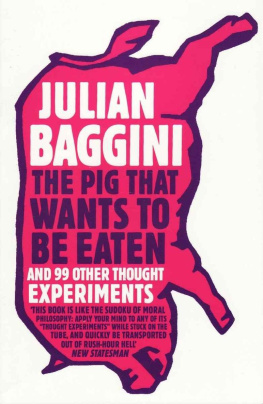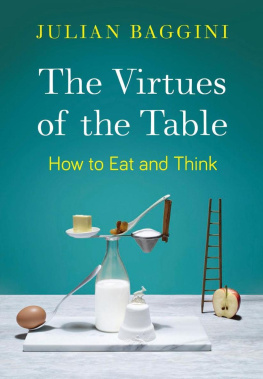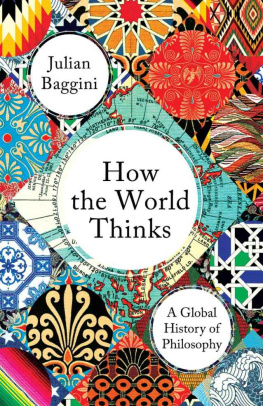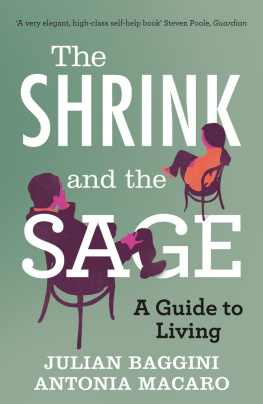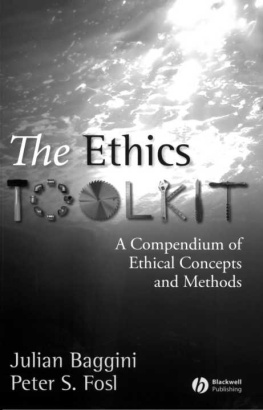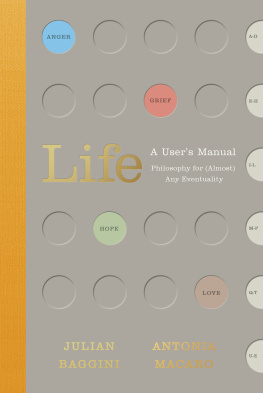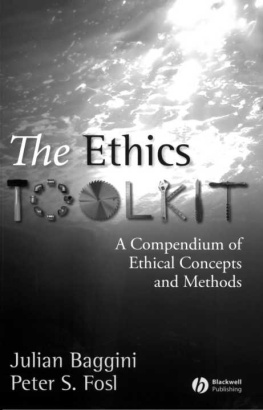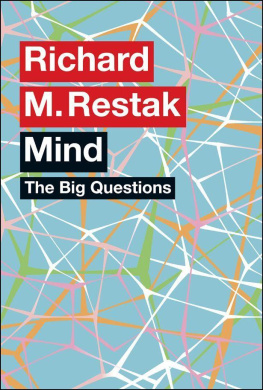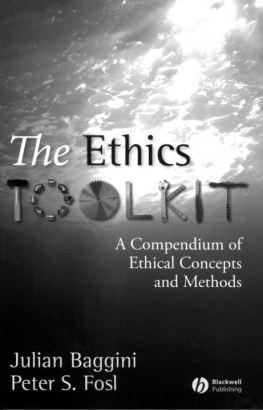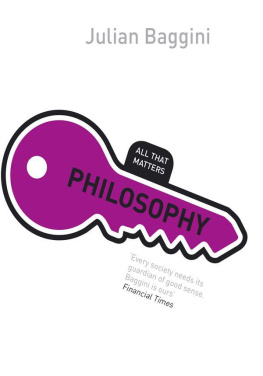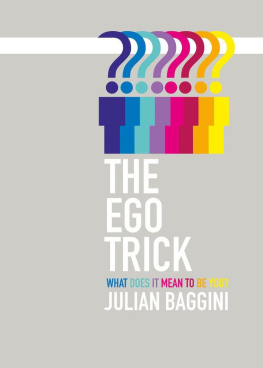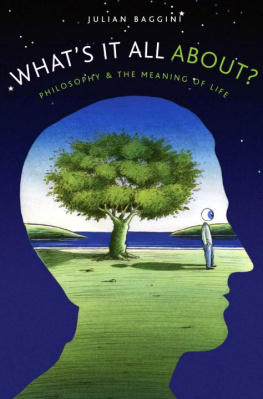THE BIG QUESTIONS
Ethics
Julian Baggini is one of Britains most popular writers on philosophy and a bestselling author. Renowned for his entertaining and straightforward treatment of the biggest philosophical issues, he has published a number of highly acclaimed books. He is a founding editor of The Philosophers Magazine and a frequent contributor to national newspapers and BBC radio.
The Big Questions confronts the fundamental problems of science and philosophy that have perplexed enquiring minds throughout history, and provides and explains the answers of our greatest thinkers. This ambitious series is a unique, accessible and concise distillation of humanitys best ideas.
Series editor Simon Blackburn is Professor of Philosophy at the University of Cambridge, Research Professor of Philosophy at the University of North Carolina and one of the most distinguished philosophers of our day.
Titles in The Big Questions series include:
PHILOSOPHY
PHYSICS
THE UNIVERSE
MATHEMATICS
GOD
EVOLUTION
MIND
ETHICS
THE BIG QUESTIONS
Ethics
Julian Baggini
SERIES EDITOR
Simon Blackburn


New York London
2012 by Julian Baggini
All rights reserved. No part of this book may be reproduced in any form or by any electronic or mechanical means, including information storage and retrieval systems, without permission in writing from the publisher, except by reviewers, who may quote brief passages in a review. Scanning, uploading, and electronic distribution of this book or the facilitation of the same without the permission of the publisher is prohibited.
Please purchase only authorized electronic editions, and do not participate in or encourage electronic piracy of copyrighted materials. Your support of the authors rights is appreciated.
Any member of educational institutions wishing to photocopy part or all of the work for classroom use or anthology should send inquiries to Permissions c/o Quercus Publishing Inc., 31 West 57th Street, 6th Floor, New York, NY 10019, or to .
e-ISBN 978-1-62365-595-2
Distributed in the United States and Canada by Random House Publisher Services
c/o Random House, 1745 Broadway
New York, NY 10019
www.quercus.com
Contents
Doing as you would be done by
Doing wrong for the sake of what is right
The legitimacy of all necessary means
The ethics of preferential treatment
The duty to rescue
The link between law and morality
Expanding the moral circle
The value of human life
The right to end your own life
Ethics beyond prudery
Sameness, difference and equality
The ethics of global business
On whether nature can be harmed
Criminality and being in your right mind
The rights and wrongs of armed conflict
How to stop a ticking bomb
What facts tell us about values
The variability of moral codes
The link between morality and religion
The limits of ethics
PREFACE
In common with most other periods in history, ours is a time of moral decline. At least, thats what most people seem to think. In the United States, Gallup conducts an annual poll which always finds a large majority believing that moral values are in decline, with around 3845 per cent judging the countrys values to be poor and only 1423 per cent rating them good or excellent.
Moralitys descent, however, seems to be accompanied by the ascent of ethics. Go into any mainstream supermarket nowadays and youll find a number of ethical products, from fairly traded food to eco-friendly cleaners. Most businesses now have codes of ethics and heads of Corporate Social Responsibility. Even during the worst economic slump since the 1930s, Britain continued to spend more on overseas aid, reaching an all-time high of 0.56 per cent of GDP in 2011, due to rise to 0.7 per cent by 2013.
How can we explain this strange juxtaposition of perceived moral decline and increased ethical awareness? I think that part of the explanation lies in the remedial level of public discourse about values. Put bluntly, few of us have any idea how to talk or think about ethics. In place of lucid thought, we find only confused perception.
The perception of decline comes when people think of morality in terms of established rules and norms, particularly to do with sexual and anti-social conduct. But this is only a small part of what comprises right and wrong conduct. In many other respects, people are more aware of the impact their actions have on others, hence the rise of business ethics and the ethical consumer. To put it simply, if morality means adherence to conventional rules, and ethics means trying to do the right thing more broadly, morality may well be in decline even as ethics at least holds its ground.
Some of the general confusion about ethics and morality stems from the fact that the two terms are used interchangeably and there is no settled consensus even among moral philosophers about how each should be defined. I take morality to be concerned with the actions we are permitted or not permitted to do, almost always ones that affect other people. Ethics is a somewhat wider term, encompassing all that relates to life going well or badly. So, for example, many ethical theorists have talked about the role that contemplation or friendship should play in the good life, but you are not immoral if you fail to match up to the standard set. The biggest questions in ethics, however, do tend to be deeply moral ones, as they concern not only how well our own lives go but how our actions might seriously affect the welfare of others.
The way I have approached twenty of these big questions reflects an important aspect of ethics that emerges throughout the book. On the one hand, I want to cover as many of the major ideas, arguments and concepts in moral philosophy as possible. On the other, this is not a textbook and in any case, I do not believe that the straightforward Kant said this and Aristotle believed that approach to ethics best helps to develop our ability to think about the dilemmas we face, individually and as a society. Real moral reasoning requires personal engagement with issues, not a run through standard positions. So there are two competing goods: the desire to be comprehensive and objective and the desire to engage more closely and personally with the big questions. As I hope will be clear by the end of the final chapter, this reflects a deeper truth about ethics: values often conflict, not because one is wrong and one is right, but simply because sometimes having more of one good means we cannot have as much of another. In balancing these competing goods of objectivity and engagement, youll find that I sometimes offer more detached explanations of the views of great philosophers and sometimes follow a line of argument that is my own, albeit highly indebted to the thoughts of others. This makes my own judgements and biases clear while still giving plenty of room for the perspectives of others. My hope is that, having read the book, you will also become clearer about your own judgements and biases, perhaps changing them in the light of the perspectives of the great ethical thinkers of the past and present.
IS THERE A GOLDEN RULE?
Doing as you would be done by
What exactly does the Golden Rule say and is it really a good bedrock for ethics? In its simplicity and call for equality of consideration it is certainly an appealing principle. But all that glitters is not gold. Of what element is this one made?
Next page

